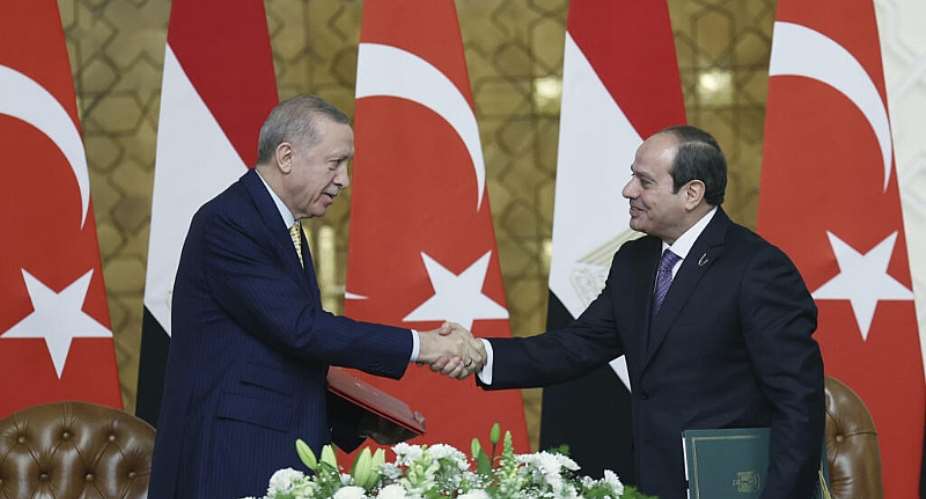Turkish President Recep Tayyip Erdogan's visit to Cairo this week formally ended more than a decade of animosity with his Egyptian counterpart Abdel Fattah al-Sisi, with the two leaders committing their countries to a new era of cooperation.
A military band and gun salute welcomed Erdogan when he arrived in Cairo on Wednesday, as Sisi rolled out the red carpet for his Turkish counterpart.
Not long ago, the two leaders were more used to exchanging angry barbs. But now the talk is about cooperation to prevent Israel's looming military offensive against Hamas in the southern Gaza Strip and the growing humanitarian crisis there.
"We will continue the cooperation and solidarity with our Egyptian brothers for the bloodshed in Gaza to stop," Erdogan declared at a joint press conference with Sisi.
"In the medium term, we are ready to work with Egypt for Gaza to recover and be rebuilt."
Decade-long rift
Bilateral relations plunged into a deep freeze after Sisi ousted Erdogan's close ally, Mohamed Morsi, in a 2013 coup.
Erdogan's visit to Cairo resulted from intense and ultimately successful diplomatic efforts to end years of antagonism between the leaders.
"Reconciliation, an official visit by the Turkish president to Egypt, a meeting there is in and of itself significant," observes international relations expert Soli Ozel, a lecturer at Istanbul's Kadir Has University.
"Given what transpired in the past, obviously, this is a major move on the part of both President Erdogan and President Sisi."
Clampdown on critical media
For years, groups affiliated with Morsi's Muslim Brotherhood and critical of Sisi broadcast from Istanbul – further stoking tensions between Turkey and Egypt.
"These Political Islam-inspired narratives across the whole region are obviously something that is considered corrosive by the Egyptian government," says political scientist Jalel Harchaoui, of the Royal United Services Institute for Defence and Security Studies in London.
Harchaoui claims moves by Ankara to curtail opposition TV broadcasting in recent years facilitated the rapprochement with Cairo.
"It has always found a home in terms of being able to get broadcast across the region in Istanbul. But Erdogan was able to reduce these freedoms as part of his conversation with Cairo," Harchaoui says.
Regional realignment
Turkey's deployment of troops in the Middle East and North Africa is also a point of tension with Cairo. Turkey and Egypt backed rival sides in the Libyan civil war.
But Erdogan, speaking to the media with Sisi, pledged a new era of cooperation.
"We had the opportunity to evaluate the issues in Libya, Sudan and Somalia," the Turkish president said. "We give full support to the unity, togetherness, territorial integrity and peace of these three brotherly countries."
During his Cairo visit, Erdogan underlined that rapprochement with Sisi was part of a more comprehensive policy of repairing ties across the region.
"We never want to see conflict, tension, or crises in Africa, the Middle East or other places in our geography," Erdogan said.
"With this aim, we are determined to increase our contacts with Egypt at every level for the establishment of peace and stability in our region."
Libya breakthrough?
Turkey and Egypt are two of the region's powerhouses, and rivalry between the countries has only exacerbated conflicts in the region, particularly in Libya, argues Libyan security analyst Aya Burweila.
"In general, I think this is good," she said of their rapprochement. "I think it's helpful for Libya as well because both sides support different factions in Libya. And the stalemate has gone on for such a long time.
"It's about time that the existing powers figure out something that everybody can agree on, and there is a deal to be had."
Burweila believes Erdogan's rapprochement with Sisi and the broader region is also born out of the realisation that cooperation is more productive than rivalry.
"I think both parties realised that the best way forward is to cooperate and discuss, and that Turkey has realised that without economic partners in the Middle East, it cannot move forward," she said.
Turkish Foreign Minister Hakan Fidan, on a visit to Libya this month, stressed the importance of Erdogan's meetings in Cairo to secure Libya's long-term future.
Erdogan and Sisi also discussed the development of the region's energy resources.
Such cooperation, observers suggest, could mark a new era in bilateral relations between these two regional heavyweights.





 Court dismisses Serwaa Amihere case against Henry Fitz, two others
Court dismisses Serwaa Amihere case against Henry Fitz, two others
 Stolen BRVs: Bi-partisan parliamentary probe non-negotiable — Dr. Omane Boamah
Stolen BRVs: Bi-partisan parliamentary probe non-negotiable — Dr. Omane Boamah
 Bawumia begins regional campaign tour on Monday
Bawumia begins regional campaign tour on Monday
 With great urgency backed by verifiable data, facts and figures dismiss COCOBOD,...
With great urgency backed by verifiable data, facts and figures dismiss COCOBOD,...
 EC’s statement on obsolete BVDs discovery “lies, half-truths, pure fantasies” – ...
EC’s statement on obsolete BVDs discovery “lies, half-truths, pure fantasies” – ...
 Nalerigu court impound vehicles of DCE, Director of Chereponi district for owing...
Nalerigu court impound vehicles of DCE, Director of Chereponi district for owing...
 Cop, 7 others grabbed over $523,000 Gold Scam
Cop, 7 others grabbed over $523,000 Gold Scam
 Akufo-Addo’s driver wins Dadekotopon NPP Parliamentary Primary
Akufo-Addo’s driver wins Dadekotopon NPP Parliamentary Primary
 Investigate, jail persons liable for GRA-SML contract – Manasseh
Investigate, jail persons liable for GRA-SML contract – Manasseh
 Lawyer wins Akan NPP Parliamentary Candidate primary
Lawyer wins Akan NPP Parliamentary Candidate primary
